Related Research Articles

The Boxer Rebellion,also known as the Boxer Uprising,was an anti-foreign,anti-imperialist,and anti-Christian uprising in North China between 1899 and 1901,towards the end of the Qing dynasty,by the Society of Righteous and Harmonious Fists,known as the "Boxers" in English due to many of its members having practised Chinese martial arts,which at the time were referred to as "Chinese boxing". It was defeated by the Eight-Nation Alliance of foreign powers.
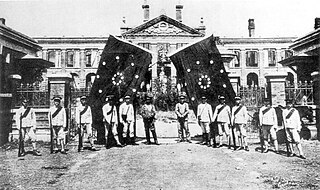
The Wuchang Uprising was an armed rebellion against the ruling Qing dynasty that took place in Wuchang in the Chinese province of Hubei on 10 October 1911,beginning the Xinhai Revolution that successfully overthrew China's last imperial dynasty. It was led by elements of the New Army,influenced by revolutionary ideas from Tongmenghui. The uprising and the eventual revolution directly led to the downfall of the Qing dynasty with almost three centuries of imperial rule,and the establishment of the Republic of China (ROC),which commemorates the anniversary of the uprising's outbreak on 10 October as the National Day of the Republic of China.
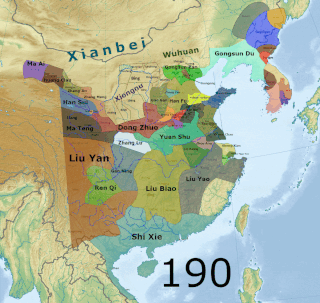
The military history of the Three Kingdoms period encompasses roughly a century's worth of prolonged warfare and disorder in Chinese history. After the assassination of General-in-chief He Jin in September 189,the administrative structures of the Han government became increasingly irrelevant. By the time of death of Cao Cao,the most successful warlord of North China,in 220,the Han empire was divided between the three rival states of Cao Wei,Shu Han and Eastern Wu. Due to the ensuing turmoil,the competing powers of the Three Kingdoms era found no shortage of willing recruits for their armies,although press-ganging as well as forcible enlistment of prisoners from defeated armies still occurred. Following four centuries of rule under the Han dynasty,the Three Kingdoms brought about a new era of conflict in China that shifted institutions in favor of a more permanent and selective system of military recruitment. This ultimately included the creation of a hereditary military class as well as increasing reliance on non-Chinese cavalry forces and the end of universal conscription.
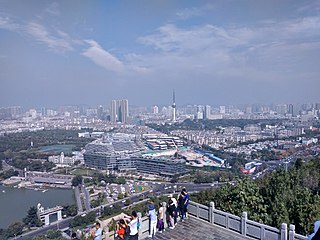
Xuzhou,also known as Pengcheng (彭城) in ancient times,is a major city in northwestern Jiangsu province,China. The city,with a recorded population of 9,083,790 at the 2020 census,is a national complex transport hub and an important gateway city in East China. Xuzhou is a central city of Huaihai Economic Zone and Xuzhou metropolitan area. Xuzhou is an important node city of the country's Belt and Road Initiative,and an international new energy base. Xuzhou has won titles such as the National City of Civility (全国文明城市) and the United Nations Habitat Scroll of Honour award.
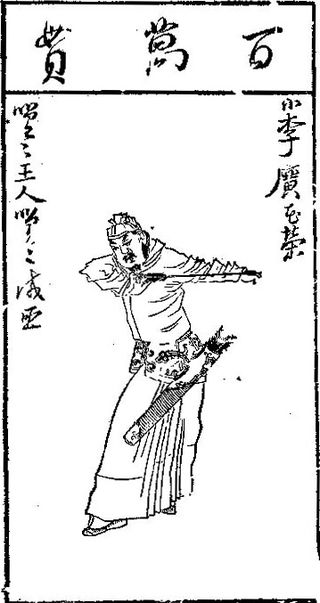
Hua Rong is a fictional character in Water Margin,one of the Four Great Classical Novels of Chinese literature. Nicknamed "Little Li Guang",he ranks ninth among the 36 Heavenly Spirits,the first third of the 108 Stars of Destiny.

Huang Xin is a fictional character in Water Margin,one of the Four Great Classical Novels in Chinese literature. Nicknamed "Guardian of the Three Mountains",he ranks 38th among the 108 Stars of Destiny and second among the 72 Earthly Fiends.

The Warlord Era was the period in the history of the Republic of China between 1916 and 1928,when control of the country was divided between former military cliques of the Beiyang Army and other regional factions. It began after the death of Yuan Shikai,the de facto dictator of China after the Xinhai Revolution had overthrown the Qing dynasty and established the Republic of China in 1912. Yuan's death on 6 June 1916 created a power vacuum which was filled by military strongmen and widespread violence,chaos,and oppression. The Nationalist Kuomintang (KMT) government of Sun Yat-sen,based in Guangzhou,began to contest Yuan's Beiyang government based in Beijing for recognition as the legitimate government of China.
The Big Swords Society or Great Knife Society was a traditional peasant group most noted for the killing of two German Catholic missionaries at the Juye Incident in 1897 at Zhang Jia Village where the missionaries were ambushed in their sleep by about 30 armed men. The Big Swords Society was widespread in North China during the Qing Dynasty and noted for its reckless courage. Rather than one large overarching organization,the Big Swords were local groups of small-holders and tenant farmers organized to defend villages against roaming bandits,warlords,tax collectors or later the Communists and Japanese.
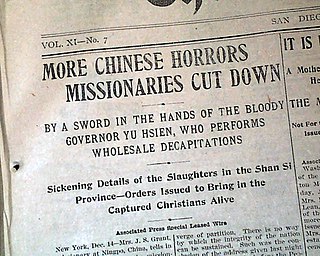
The Taiyuan massacre took place during the Boxer Rebellion,July 9,1900,in Taiyuan,Shanxi province,North China. Sources recall that they were killed in the presence of Yuxian,governor of Shanxi. 44 people were killed including children.
Pang Xun (龐勛) was the leader of a major rebellion,by soldiers from Xu Prefecture,against the rule of Emperor Yizong of the Chinese Tang dynasty,from 868 to 869. He was eventually defeated by the Tang general Kang Chengxun,who was assisted by the Shatuo general Zhuye Chixin.

Yuxian (1842–1901) was a Manchu high official of the Qing dynasty who played an important role in the violent anti-foreign and anti-Christian Boxer Rebellion,which unfolded in northern China from the fall of 1899 to 1901. He was a local official who rose quickly from prefect of Caozhou to judicial commissioner and eventually governor of Shandong province. Dismissed from that post because of foreign pressure,he was soon named governor of Shanxi province. At the height of the Boxer crisis,as Allied armies invaded China in July 1900,he invited a group of 45 Christians and American missionaries to the provincial capital,Taiyuan,saying he would protect them from the Boxers. Instead,they were all killed. Foreigners,blaming Yuxian for what they called the Taiyuan Massacre,labeled him the "Butcher of Shan-hsi [Shanxi]".

The Juye Incident refers to the killing of two German Catholic missionaries,Richard Henle and Franz Xaver Nies,of the Society of the Divine Word,in Juye County Shandong Province,China in the night of 1–2 November 1897. The target of the attack,Georg Maria Stenz,survived unharmed.
The Battle of Senluo Temple was a clash between members of the "Militia United in Righteousness" and Qing government troops that took place on October 18,1899,near a temple located on the western edge of Pingyuan County in northwestern Shandong. The Boxers were armed with swords,spears and a few hunting rifles. In a first skirmish they inflicted a few casualties on Qing troops and forced them to retreat,but the Qing army won the battle in a counterattack during which at least 27 Boxers were killed. After the Shandong authorities caught and executed the Boxer leaders in the following months,the Boxer movement died off in the immediate area,partly because local peasants could see that the Boxers' invulnerability rituals did not work. However,thanks to its non-centralized organization and driven by widespread support for its anti-Christian activities,the Boxer movement continued to spread quickly,culminating in the Boxer Rebellion that engulfed northern China in the spring and summer of 1900.

The Monkey King Festival is celebrated in Hong Kong on the 16th day of the eighth Lunar month of the Chinese calendar,corresponding to September according to the Common era calendar,a day after the Mid Autumn Festival. The origin of the festival is traced to the epic 16th century novel Journey to the West written by the Chinese novelist Wu Cheng'en (1500–1582) during the Ming dynasty (1368–1644). The novel brings out the concept of immortality from Taoism and rebirth from Buddhism. The monkey Sun Wukong,a character in the novel,is the featured figure of the festival.

The Red Lanterns were a women's fighting group organized during the Boxer Uprising of 1900. Villagers said these women had supernatural powers which helped to protect the male Boxers and fight against foreign enemies.

The Boxers,officially known as the Society of Righteous and Harmonious Fists (traditional Chinese:義和拳;simplified Chinese:义和拳;pinyin:Yìhéquán;Wade–Giles:I4-ho2-ch'üan2) among other names,were a Chinese secret society based in Northern China that carried out the Boxer Rebellion from 1899 to 1901.
The Red Spear Society staged a major uprising in 1928–1929 against the rule of Liu Zhennian,the Nationalist government-aligned warlord ruler of eastern Shandong province in Republican China. Motivated by their resistance against high taxes,rampant banditry and the brutality of Liu's private army,the Red Spear peasant insurgents captured large areas on the Shandong Peninsula and were able to set up a proto-state in Dengzhou county. Despite this,the whole insurgency was eventually crushed by Liu in late 1929.

The Yellow Sand Society,also known as Yellow Way Society,and Yellow Gate Society,was a rural secret society and folk religious sect in northern China during the 19th and 20th century.
Liu Sanjie was a Chinese folk music singer,who is the Liu family's third daughter,with an original name of Liu Shanhua. Liu is a legendary figure of Zhuang people in Guangxi and her songs were melodious and touching,therefore she was dubbed as the "Goddess of Singing". The earliest story about her can be found in the Southern Song Dynasty (1127-1279). Many legends and folk songs about her were created starting in the Ming (1368-1644) and Qing (1644-1911) dynasties. Liu Sanjie is said in one version to be a commoner girl born in 703 in Zhuang. She was said to be a wunderkind,able to compose impromptu songs at will. Her songs were touching and sonorous,so she was called the Song Fairy. She subsequently taught singing in the surrounding areas. Many people have come to compete with her in singing. Her talent,however,attracted jealousy from the local hoodlums,which resulted in her early death. The evil farmer Mo Huairen was said to make Liu Sanjie his slave girl and bribed officials to oppress her when she refused to do so. Despite various versions of Liu Sanjie's tales,for hundreds of years,Zhuang people have maintained their adoration for her.
Zhao Sanduo was a leader of the Boxer Rebellion during the late Qing dynasty. His courtesy name was Zhusheng,and he was also known as Zhao Laozhu or Zhao Luozhu. He had led many attacks against foreign nationals and Christians in China from 1892 to 1900. He was arrested by Yuan Shikai in 1902 and died in prison.
References
- 1 2 Cohen 1997, p. 17.
- 1 2 3 4 Esherick 1987, p. 107.
- ↑ Lu 1987, p. 45.
- ↑ Esherick 1987, pp. 104 (Zhao's origins) and 107 (as Liu's teacher).
- ↑ Naquin 1976, pp. 30–31 (use by Eight Trigrams); Esherick 1987, p. 107 (Zhao teaches it to Liu Shiduan).
- ↑ Esherick 1987, p. 55 ("kung fu", protection against blades); Cohen 1997, pp. 17–19 ("qigong", protection against bullets).
- ↑ Esherick 1987, pp. 105–6.
- ↑ Esherick 1987, pp. 96–7.
- ↑ Esherick 1987, pp. 107–8.
- ↑ Esherick 1987, p. 104.
- ↑ Esherick 1987, p. 109.
- ↑ Esherick 1987, pp. 109–10.
- ↑ Esherick 1987, p. 110.
- ↑ Esherick 1987, p. 111.
- ↑ Esherick 1987, pp. 111–12, citing a local official's assessment.
- ↑ Esherick 1987, p. 112.
- ↑ Esherick 1987, p. 113.
- ↑ Esherick 1987, pp. 89–90 and 113.
- ↑ Esherick 1987, p. 114.
- 1 2 Esherick 1987, pp. 114–15.
- ↑ Esherick 1987, p. 115.
- ↑ Esherick 1987, pp. 115–16.
- ↑ Esherick 1987, p. 115–17.
- ↑ Esherick 1987, p. 117.
- 1 2 3 4 Esherick 1987, p. 118.
- ↑ Esherick 1987, pp. 117–8.
- 1 2 Esherick 1987, p. 119.
- ↑ Esherick 1987, p. 119–20.
- 1 2 Esherick 1987, p. 120.
- ↑ Cohen 1997, p. 20.